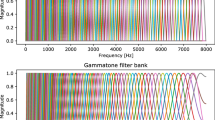Abstract
For many Automatic Speech Recognition (ASR) tasks audio features as spectrograms show better results than Mel-frequency Cepstral Coefficients (MFCC), but in practice they are hard to use due to a complex dimensionality of a feature space. The following paper presents an alternative approach towards generating compressed spectrogram representation, based on Convolutional Variational Autoencoders (VAE). A Convolutional VAE model was trained on a subsample of the LibriSpeech dataset to reconstruct short fragments of audio spectrograms (25 ms) from a 13-dimensional embedding. The trained model for a 40-dimensional (300 ms) embedding was used to generate features for corpus of spoken commands on the GoogleSpeechCommands dataset. Using the generated features an ASR system was built and compared to the model with MFCC features.
Access this chapter
Tax calculation will be finalised at checkout
Purchases are for personal use only
Similar content being viewed by others
References
Amodei, D., et al.: Deep speech 2: end-to-end speech recognition in English and Mandarin. In: ICML (2016)
Dai, B., et al.: Hidden talents of the variational autoencoder (2017)
van den Oord, A., et al.: Neural discrete representation learning. In: NIPS (2017)
van den Oord, A., et al.: WaveNet: a generative model for raw audio. In: SSW (2016)
Zhu, Z., et al.: Siamese recurrent auto-encoder representation for query-by-example spoken term detection. In: Interspeech (2018)
Milde, B., Biemann, C.: Unspeech: unsupervised speech context embeddings. In: Interspeech (2018)
Chung, Y.-A., Glass, J.R.: Speech2Vec: a sequence-to-sequence framework for learning word embeddings from speech. In: Interspeech (2018)
LibriSpeech. http://www.openslr.org/12/
Google Speech Commands. https://ai.googleblog.com/2017/08/launching-speech-commands-dataset.html
Audio\(\_\)vae. https://github.com/nsu-ai-team/audio_vae
Author information
Authors and Affiliations
Corresponding author
Editor information
Editors and Affiliations
Rights and permissions
Copyright information
© 2021 Springer Nature Switzerland AG
About this paper
Cite this paper
Yakovenko, O., Bondarenko, I. (2021). Convolutional Variational Autoencoders for Spectrogram Compression in Automatic Speech Recognition. In: van der Aalst, W.M.P., et al. Recent Trends in Analysis of Images, Social Networks and Texts. AIST 2020. Communications in Computer and Information Science, vol 1357. Springer, Cham. https://doi.org/10.1007/978-3-030-71214-3_10
Download citation
DOI: https://doi.org/10.1007/978-3-030-71214-3_10
Published:
Publisher Name: Springer, Cham
Print ISBN: 978-3-030-71213-6
Online ISBN: 978-3-030-71214-3
eBook Packages: Computer ScienceComputer Science (R0)




